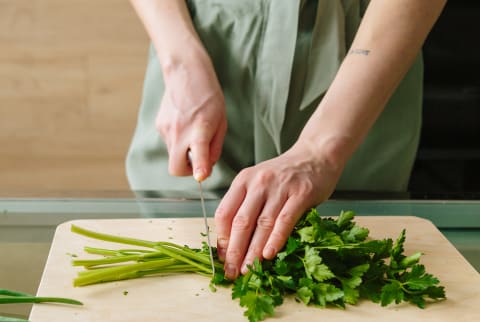Advertisement
Spices, Herbs & Other Food Sources To Help Fight Brain Fog, According To A Nutritional Psychiatrist


Brain fog is a group of symptoms, including lower cognition, an inability to multitask, and a possible loss of short- and long-term memory. Most commonly, it shows up in individuals with autism spectrum disorders, celiac disease, chronic fatigue syndrome, fibromyalgia, as well as some other medical and neuropsychiatric disorders. That said, it's definitely possible to feel foggy without these underlying conditions.
If you fall into the latter group, it's possible that your brain fog may be related to inflammatory substances in the gut, which can cause inflammation in the brain. One way to help brain fog may be using natural flavonoids from food, like luteolin.
What is luteolin, and how do I get it?
For starters, luteolin has antioxidant, anti-inflammatory, and neuroprotective actions. Research has shown that luteolin has a possible protective effect on learning1 defects and brain structures in people with Alzheimer's. These protective benefits may help to improve memory. Foods and spices rich in luteolin contain these brain-supporting properties and have been shown to help the symptoms of brain fog2 by sharpening thinking and decision-making.
Good sources of luteolin include veggies, like celery, broccoli, artichokes, cabbage, and hot and sweet peppers; as well as apple skins; spices; and herbs, such as fresh peppermint, sage, thyme, celery seeds, parsley, and oregano (especially Mexican oregano). Even though fresh herbs are delicious, in the case of oregano, the dried Mexican type has a lot more luteolin than the fresh herb. So to help your brain fog, reach for some dried Mexican oregano to add to a soup, fall roasted veggies, or even some beans or lentils.
If you are experiencing brain fog, it's a good idea to visit the doctor and rule out any underlying causes. As long as it's not more serious, adding these luteolin-rich foods and spices to the diet may help the fog lift.
A luteolin-rich soup recipe to beat brain fog.
This comforting fall (or any season) soup contains several great brain fog lifters, such as artichokes, thyme, Mexican oregano, paprika, and parsley. Plus, it's vegetarian, vegan, gluten-free, and dairy-free.
This vegan soup is both naturally rich and creamy, without any need for butter. The healthy fibers and prebiotics from leeks and artichokes help keep you fuller longer, while the nut milk makes it smooth and comforting. It comes together in just 30 minutes (10 to prep and 20 to cook) and serves four.
Creamy Artichoke & Leek Soup
Makes 4 servings
Ingredients
- 1 tablespoon olive oil
- ½ cup chopped leeks
- 1½ teaspoons kosher salt, plus more if needed
- ½ teaspoon black pepper, plus more if needed
- 1 tablespoon sweet paprika
- 1 teaspoon garlic powder
- ½ teaspoon fresh thyme
- ½ teaspoon fresh chopped parsley
- 1 teaspoon dried Mexican oregano
- 1½ cups frozen artichoke hearts
- 2 cups low-sodium vegetable stock
- 2 cups macadamia milk
- Juice of ½ lemon
- 1 tablespoon chopped fresh flat-leaf parsley
- Celery seeds and fresh parsley for sprinkling
Method
- Heat the oil in a large stainless-steel pot over medium heat, and sauté the leeks with the salt, pepper, paprika, dried oregano, garlic powder, thyme, and fresh chopped parsley for about 5 minutes (or until the leeks are soft).
- Add the artichoke hearts and allow them to soften for another 3 minutes.
- Add the stock and cover, bringing to a boil over medium heat.
- Add the nut milk and reduce the heat. Simmer, uncovered, until the artichokes are tender, about 10 minutes.
- Allow the soup to cool for a few minutes. Using an immersion blender, puree the soup to a smooth texture (you can also leave it chunky if you prefer).
- Season to taste with additional salt and pepper, if needed.
- Stir in the lemon juice and serve hot, garnished with flat-leaf parsley and celery seeds.
Bottom line.
Brain fog may be a symptom of other underlying medical conditions, but it could also be a response to inflammation in the gut or brain. After checking in with a doctor, adding luteolin to the diet through certain spices and foods can help with mental sharpness and may lower the negative effects of brain fog.

Dr. Uma Naidoo is a Harvard-trained nutritional psychiatrist, nutritional biologist, professional chef, and author of the upcoming title, Calm Your Mind With Food, which is now available for preorder, as well as the international bestseller, This Is Your Brain on Food (An Indispensible Guide to the Surprising Foods that Fight Depression, Anxiety, PTSD, OCD, ADHD, and More).
She is currently the Founder and Director of Nutritional and Lifestyle Psychiatry at Massachusetts General Hospital (MGH), the first US clinic of its kind where she consults on nutritional interventions for the psychiatrically and medically ill. Naidoo is also a culinary instructor at The Cambridge School of Culinary Arts. She writes for Harvard Health and Psychology Today. She just completed her most recent project which is a unique video cooking series for the MGH Academy that teaches nutritional psychiatry using culinary techniques in the kitchen.
More from the author:
Functional Nutrition Training
Check out Functional Nutrition Coaching
A cutting-edge nutrition deep dive taught by 20+ top health & wellness experts
Learn moreMore from the author:
Functional Nutrition Training
Check out Functional Nutrition Coaching
A cutting-edge nutrition deep dive taught by 20+ top health & wellness experts
Learn more
Dr. Uma Naidoo is a Harvard-trained nutritional psychiatrist, nutritional biologist, professional chef, and author of the upcoming title, Calm Your Mind With Food, which is now available for preorder, as well as the international bestseller, This Is Your Brain on Food (An Indispensible Guide to the Surprising Foods that Fight Depression, Anxiety, PTSD, OCD, ADHD, and More).
She is currently the Founder and Director of Nutritional and Lifestyle Psychiatry at Massachusetts General Hospital (MGH), the first US clinic of its kind where she consults on nutritional interventions for the psychiatrically and medically ill. Naidoo is also a culinary instructor at The Cambridge School of Culinary Arts. She writes for Harvard Health and Psychology Today. She just completed her most recent project which is a unique video cooking series for the MGH Academy that teaches nutritional psychiatry using culinary techniques in the kitchen.

















